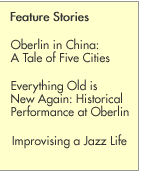
 |
|
Home :: Features :: Oberlin In China :: Page 2 Oberlin In China: A Tale of Five Cities (Continued) Beijing
There was a certain festive air in our anticipation of the group’s visit to and concerts in Beijing. We were looking forward to playing for the large audiences expected at our two concerts in the prestigious Poly Theater, and we were excited about spending New Year’s Eve in China’s historic capital and second largest city (almost 15 million people). But before we could enjoy Beijing we had to get there, and doing so ended up being a long and tiring process. We left Dalian for the airport in the wee hours, only to find our flight cancelled. We had a rescheduled flight, and although we didn’t know its departure time, it was clear that it would be many hours ahead. We decided to go to a hotel “across the street” to eat lunch and relax a bit. Everyone in our group thought we were headed across the street from the airport, but our Chinese helpers had meant across the street from the hotel in Dalian from which we had departed early that morning—and it was almost an hour’s ride from the airport. We made the trip back, ate lunch, and tried to relax in the hotel lobby, although it wasn’t set up for lounging or even long-term sitting. Eventually we returned to the airport, caught our flight, and finally arrived in Beijing at 3:30 p.m. with just three-and-a-half hours until show time. Although we were all exhausted, the musicians sprang to life the instant the music started and gave what was perhaps the most energetic performance of the entire tour. We were also thrilled to visit with President Nancy S. Dye before our second concert in Beijing. She ate dinner with us at our hotel’s restaurant and then headed to the Poly Theater to enjoy our performance. Shanghai Shanghai, the final stop on our trip, was originally a fishing village but is now a huge (18.7 million people) and fascinating city. Ultra-modern commercial architecture combines with Chinese- and European-style architecture to give Shanghai a very different feel from the other cities we had visited.
The Shanghai Concert Hall is a European-style venue with an intimate, jewel-box-like stage. As with all our concerts, we had a wonderfully appreciative audience who demanded many encores and showered the orchestra with cheers and enthusiastic shouts. By the time we arrived in Shanghai, each of us had attained some level of comfort for being in and for getting around in China. That, coupled with a bit of free time, which had been scarce until we reached Shanghai, allowed us to get out and explore. Besides shopping—Shanghai is known, after all, as a shopper’s paradise—members of our group undertook searches for the best dumplings and a trip on the world’s fastest train. Oberlin Our individual memories of the tour to China will stay with us for the rest of our lives. The basic experience of performing a concert many times is something that few student orchestras experience. Having those performances in the mystical, sometimes magical, and always surprising country of China is something few American orchestras will ever have the pleasure of doing. The energy and pure musical talent of the students, conductor, staff, and, especially, the spirited Chinese people, made this a life-changing experience for everyone involved. I can’t do justice to all the many individual stories and adventures of our students on this tour and invite the reader to look at our student blog, www.oberlinonline.org/ Oberlin’s Historic Ties to China For more than a century, Oberlin College and China have benefited from a mutually supportive relationship encompassing educational, social, and cultural exchanges, beginning with the teaching work of Oberlin graduates in the late 1800s. To commemorate the efforts of Oberlin educators in China, the Oberlin Shansi Memorial Association was founded in 1908, more than 50 years before the Peace Corps was begun. Today Shansi is an independent nonprofit organization on the Oberlin campus that sponsors numerous educational exchanges, sending Oberlin students to sites throughout Asia to work and teach, and bringing Asian scholars to the College for the same purpose. Shansi has empowered generations of participants to make constructive and useful contributions to Asian and American institutions and communities. Another strong Oberlin-China connection can be found at the Shanghai Conservatory of Music, the oldest conservatory in China. Huang Tzu, a 1926 Oberlin graduate who is widely considered to be one of the patriarchs of Western music education in modern China, was one of its founding fathers. He wrote the school’s curriculum, which ultimately became the platform for the professional study of music in China. |

